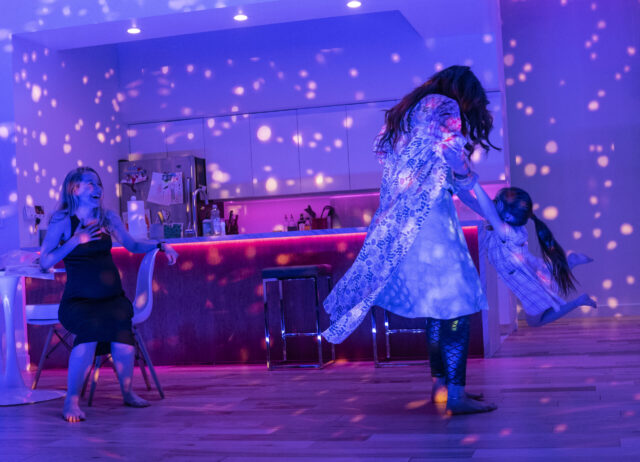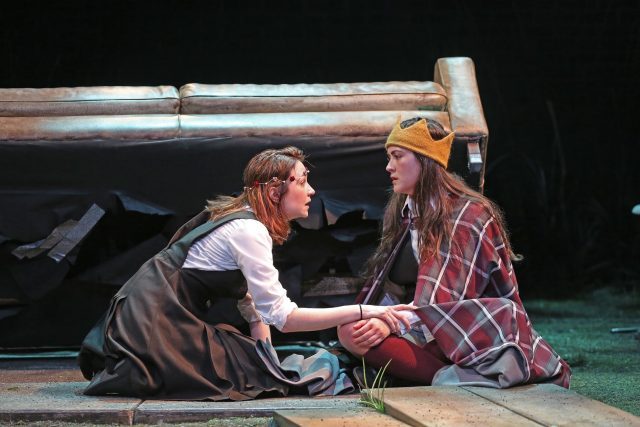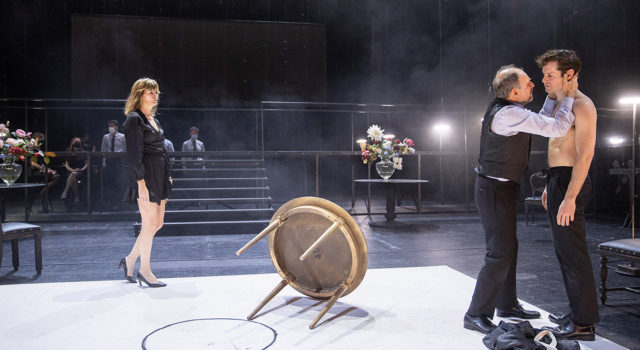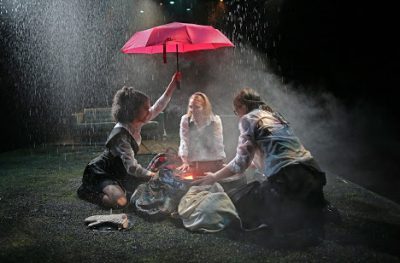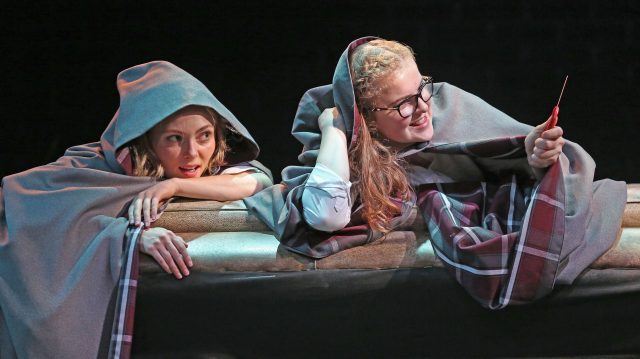
Valentine Xavier (Pico Alexander) and Lady Torrance (Maggie Siff) are lost in the dark in Orpheus Descending (photo by Gerry Goodstein)
ORPHEUS DESCENDING
Theatre for a New Audience, Polonsky Shakespeare Center
262 Ashland Pl. between Lafayette Ave. & Fulton St.
Tuesday – Sunday through August 6, $97
866-811-4111
www.tfana.org
Imagine an entire season of a nighttime soap opera, set in the south in the 1950s, mercilessly squeezed into two and a half uncomfortable hours and you have Theatre for a New Audience’s adaptation of Tennessee Williams’s Orpheus Descending, which opened Tuesday night at the Polonsky Shakespeare Center.
A rewrite of 1940’s Battle of Angels and loosely based on the Greek legend of Orpheus and Eurydice, Orpheus Descending debuted on Broadway in 1957, arriving during Williams’s most fertile period, the seventeen years that brought the world The Glass Menagerie, A Streetcar Named Desire, The Rose Tattoo, Cat on a Hot Tin Roof, Suddenly Last Summer, Sweet Bird of Youth, and The Night of the Iguana. It ran for only sixty-eight performances and was revived on Broadway by Peter Hall in 1989; otherwise, it has been unseen onstage in New York City, with good reason: It’s a hot mess, particularly in a second act that deteriorates by the minute, and there’s nothing that talented director Erica Schmidt can do to save it.
The play takes place in the Torrance Mercantile Store in a small southern town in the 1950s. The dry goods shop is run by Lady Torrance (Maggie Siff), daughter of an Italian immigrant, a woman thoroughly disappointed with life, married to Jabe Torrance (Michael Cullen), an obstinate, much older racist who seems to be at death’s door. The show opens as Jake is returning from a Memphis hospital with his unpleasant caretaker, Nurse Porter (Fiana Tóibín). Lady’s tragic back story unspools immediately: Her Italian immigrant father died when his wine garden was burned to the ground by the Klan for serving Black customers. In his memory, Lady is building a confectionery adjoined to the store, trying to bring at least some sweetness into her sour existence.
The town is all abuzz when a handsome stranger, Valentine Xavier (Pico Alexander), mysteriously arrives, wearing a snakeskin jacket and carrying an acoustic guitar. The local gossips, Eva Temple (Kate Skinner), Sister Temple (Prudence Wright Holmes), Dolly Hamma (Molly Kate Babos), and Beulah Binnings (Laura Heisler), are all atwitter about Val, serving as a kind of judgmental Greek chorus. Carol Cutrere (Julia McDermott), a sad, oversexed twenty-seven-year-old hellraiser with too much mascara who walks around barefoot in a trench coat and has been banned from town, takes an immediate interest in Val, who asks Carol why she makes such a spectacle of herself. “I’m an exhibitionist!” she declares. “I want to be noticed, seen, heard, felt! I want them to know I’m alive! Don’t you want them to know you’re alive?” Her version of being alive mainly consists of driving up and down the local highway drinking and dancing in every juke joint along the way.

David Cutrere (James Waterston) and Lady Torrance (Maggie Siff) rehash the past in rare Tennessee Williams revival (photo by Gerry Goodstein)
Lady, who once upon a time was in love with Carol’s brother, David (James Waterston), is desperate to be free, in some ways jealous of Carol. When Val tells her about a type of bird that has no legs and so instead must remain perpetually in the air, never touching the ground, Lady is intrigued, as if there is a heaven out there where she can escape her hell on earth. “I don’t think nothing living has ever been that free, not even nearly,” she says.
Vee Talbott (Ana Reeder), the wife of the sheriff (Brian Keane), knows Val is alive, cuddling up to him and showing him her paintings, abstract religious works based on her visions. “I paint a thing how I feel it instead of always the way it actually is. Appearances are misleading, nothing is what it looks like to the eyes. You got to have — vision — to see!” she explains. But nobody in this community can see beyond what they already know.
The more Jabe abuses Lady — upstairs in his room, he often pounds the floor with his cane three times, the sound echoing like a missive from the devil — the more she falls for Val, setting up a space in the store where he can secretly sleep over. Meanwhile, Jabe’s henchmen, Dog Hamma (Matt DeAngelis) and Pee Wee Binnings (Gene Gillette), are ready to do his bidding, eagerly anticipating being able to use their fists and guns. They get their chance in a wildly uneven and incredulous finale that is reimagined by Schmidt, straying from the original with reckless abandon. Oh, and before I forget, and I wish I could forget, there is also a clown (DeAngelis), who is clearly the work of a demon, and a conjurer known as Uncle Pleasant (Dathan B. Williams), who appears from, well, I have no idea.
“Curiosity is a human instinct,” Beulah says at one point, and that’s essentially what this production of Orpheus Descending is, a curiosity. Schmidt has previously directed the unique and unforgettable Shakespeare adaptation Mac Beth for Red Bull, an uneven musical version of Cyrano and the powerful coming-of-age drama All the Fine Boys for the New Group, and the underappreciated and underseen Lucy for Audible. In each of those shows, she displayed a daring feel for narrative, willing to challenge herself and the audience, but her efforts go astray with Orpheus Descending, which is not among Williams’s finest.

Julia McDermott steals the show as Carol Cutrerein TFANA (photo by Gerry Goodstein)
As opposed to the legless bird flying free, the play never gets off the ground. Amy Rubin’s claustrophobic two-floor set features a ceiling and walls that can barely contain the cast; the large, empty spaces to the right and left apparently alternate between the confectionery and Val’s sleeping quarters and places for some actors to sit while waiting to reenter the scene. In addition, the entrances to these areas are inconsistent, with characters sometimes walking through a door and other times around it in what seems like an impossible geography.
The play might not have a great history, but it has attracted marvelous casts. Cliff Robertson was Val, Maureen Stapleton was Lady, and Lois Smith was Carol in its 1957 Broadway bow; Marlon Brando was Val, Anna Magnani Lady, and Joanne Woodward Carol in Sidney Lumet’s 1960 film version, The Fugitive Kind; and Kevin Anderson was Val, Vanessa Redgrave Lady, and Anne Twomey Carol in the 1989 Broadway revival.
At TFANA, only McDermott (Heroes of the Fourth Turning, Epiphany) and Reeder (In the Blood, Sight Unseen) distinguish themselves, the former portraying Carol with a dark sadness, the latter adding an innate, innocent charm to Vee. Alexander (The Portuguese Kid, Punk Rock) is too understated as Val, who barely plays his guitar, while Siff (Billions, Curse of the Starving Class) ably runs the gamut of emotions Lady goes through, but even as the text repeatedly makes her Italian heritage clear, the actress produces an Eastern European accent that befuddles the audience with its incongruity.
Throughout the play, Williams refers to one of his favorite topics, corruption. “I lived in corruption but I’m not corrupted,” Val says. Everyone in Orpheus Descending lives in corruption but most of them are not corrupted as they try to survive in a bardo between heaven and hell. Unfortunately, this version of the story is stuck in the bardo as well; for an irresistible show about Orpheus and Eurydice, you’re much better off heading over to Hadestown at the Walter Kerr on Broadway.

